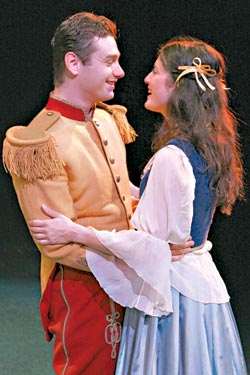Director Rita Giomi and crew have scored an unqualified success with their Seattle Shakespeare Company production of Much Ado About Nothing, a straight-up, no-nonsense adaptation that finds a charming balance between the play’s comic tomfoolery and its darker, more cynical elements. Giomi—who’s been hard at work recently directing shows for Seattle Children’s Theater (Sleeping Beauty and The Devil and Daniel Webster) as well as last month’s strong production of Kenneth Lonergan’s Lobby Hero at Seattle Public Theater—allows full play to Shakespeare’s punchy poetry and snarky ripostes, given clear and bright expression in the easy flow of uncluttered choreography and brisk pacing. Through this smart but uncomplicated treatment, the simple plot, so archetypal in its sitcom structure of love discovered, sabotaged, and regained, comes across with a sense of freshness and captivating urgency, as though recovered from the staid orthodoxy of familiar things. The key to all this, ultimately, is the sharp casting. Everyone’s good, but a number of roles of varying size and significance are so well-suited and strongly, wisely played that they grant the whole work a shimmering vibrancy.
Much Ado is a play about, to crib an Alice Munro short-story title, “hateship, friendship, courtship, loveship, and marriage”—but mostly about courtship, and the sometimes adversarial gaming and barbed back-and-forth that can all but obscure the powerful underlying attraction two people share. Although Ado revolves around the engagement and near-tragic misunderstanding suffered by Claudio (MJ Sieber) and Hero (Alexandra Tavares) at the hands of the devious Don John (Timothy Hornor), under Giomi’s influence the play’s real heart becomes the edgy, hilarious sparring of Benedick and Beatrice, expertly played by Paul Morgan Stetler and SSC artistic director Stephanie Shine. From their opening scenes, the pair establishes a kind of itchy, sexy chemistry, full of familiarity and snap. Ever at each other’s throat, their mutual attraction is clear to everyone but themselves, and Shine and Stetler dance this dance with perfect restraint, giving their inverted courtship a slow burn that is just delicious to watch.
This show really starts to rev up in Act 2. Relationships established, the conflict in place, the cast digs deep into the characters’ cores, and Giomi builds tension by playing Hero’s fall as a mini-tragedy in itself, full of real anguish. The drama is genuinely riveting, thanks in part to strong performances from James Dean as Antonio and Gordon Carpenter as Leonato. However, the night’s highlight is Todd Jefferson Moore’s turn as the incompetent constable Dogberry. Last seen at SSC as the lead in Richard III, Moore absolutely sinks his teeth into this small but delightfully written part, playing it for every inch of comic kick. He’s wonderful: Full of mock officiousness, smarmy, desperate for respect, and spewing malapropisms left and right, Moore’s Dogberry is a slapstick portrait of partial power corrupted partially—the Elizabethan equivalent of a rent-a-cop. It’s the kind of performance people win awards for.
Giomi’s achieved a minor triumph here, reinvigorating a well-worn albeit beloved play to such a degree that it seems fresh and surprising. What’s more, there’s no sleight of hand in the effort. Good acting and fidelity to the script are revolutionary acts, a dramatic application of Occam’s razor: The simplest approach is the strongest and most effective. If there is anything notably idiosyncratic in Giomi’s method, it is her close reading of the play—she isolates every scene’s dominant psychology and sentiment, allowing them to dictate pacing and dramatic emphasis. The rest takes care of itself.








